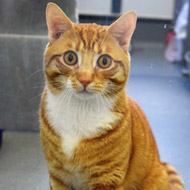Animal charity offers up mousers to Parliament

Ginger tom Simba is the purrfect candidate for chief mouser.
A leading animal charity has been urging Parliament to take on one of its cats to sort out a growing mouse infestation since 2014, it has been revealed.
Battersea Dogs and Cats Home first approached Westminster authorities to suggest taking on one of its mousers in early 2014, after the cost of pest control for Parliament during the 2012/13 financial year was revealed to be £73,552.
That figure has since doubled and includes the cost of hiring a full-time pest control technician.
Battersea's head of catteries, Lindsey Quinlan said: "Battersea has been hearing persistent reports of mice scuttling around the Houses of Parliament for several years now, and the latest figures released clearly demonstrate that tax payers are funding a rising cost for pest control in our Government buildings.
"Battersea has over 130 years in rehoming rescue cats and was the first choice for Downing Street, the Foreign & Commonwealth Office, and the Cabinet Office when they sought our mousers to help with their own rogue rodents. We'd be more than happy to help the Houses of Parliament recruit their own chief mousers to eliminate their pest problem and restore order in the historic corridors of power."
Battersea hopes its success in rehoming Larry, Palmerston and Gladstone in recent years could help relieve any perceived health and safety concerns about having the cats in the offices. In 2016, the charity re-homed some 50 cats to working farms and believes it is ideally placed to advise MPs on how to ensure the welfare of cats roaming the site.
Battersea Dogs and Cats Home currently has around 62 cats looking for a home, including several who would pounce on the opportunity given the chance. Potential candidates include seven-year old Peggy, who has a proven track record of bringing back presents, and a gorgeous ginger tom called Simba, who loves to chase and pounce.



 The RCVS has announced a new version of its 1CPD mobile app, with enhanced features for veterinary surgeons and veterinary nurses to record their continuing professional development.
The RCVS has announced a new version of its 1CPD mobile app, with enhanced features for veterinary surgeons and veterinary nurses to record their continuing professional development.